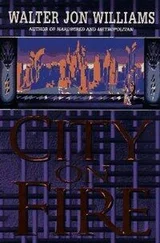Walter Williams - The Rift
Здесь есть возможность читать онлайн «Walter Williams - The Rift» весь текст электронной книги совершенно бесплатно (целиком полную версию без сокращений). В некоторых случаях можно слушать аудио, скачать через торрент в формате fb2 и присутствует краткое содержание. Год выпуска: 2013, Издательство: Baen Books, Жанр: Фантастика и фэнтези, на английском языке. Описание произведения, (предисловие) а так же отзывы посетителей доступны на портале библиотеки ЛибКат.
- Название:The Rift
- Автор:
- Издательство:Baen Books
- Жанр:
- Год:2013
- ISBN:нет данных
- Рейтинг книги:3 / 5. Голосов: 1
-
Избранное:Добавить в избранное
- Отзывы:
-
Ваша оценка:
- 60
- 1
- 2
- 3
- 4
- 5
The Rift: краткое содержание, описание и аннотация
Предлагаем к чтению аннотацию, описание, краткое содержание или предисловие (зависит от того, что написал сам автор книги «The Rift»). Если вы не нашли необходимую информацию о книге — напишите в комментариях, мы постараемся отыскать её.
The Rift — читать онлайн бесплатно полную книгу (весь текст) целиком
Ниже представлен текст книги, разбитый по страницам. Система сохранения места последней прочитанной страницы, позволяет с удобством читать онлайн бесплатно книгу «The Rift», без необходимости каждый раз заново искать на чём Вы остановились. Поставьте закладку, и сможете в любой момент перейти на страницу, на которой закончили чтение.
Интервал:
Закладка:
There was a moment’s hesitation, and then the judge spoke. “Have you talked to him yourself, Mr. President?”
“I have.”
“And what has he told you?”
“He said that the bull market might be due for a correction, and that he was monitoring the situation and would act, if necessary, at the appropriate time. But that a mere downturn in stock prices was not a case, strictly speaking, for intervention.”
“I take it, sir, that you pointed out the importance of the economic summit?”
“I did my best. He suggested, first, that this unsettled period in the markets might end before the conference begins, and might in fact end in a big upswing. Also, he said that it would be better for the conference if plans were made on a basis of actual conditions and not, as he put it, ‘false optimism.’”
“Damn,” the judge said. “Sam’s really being a hardass, isn’t he?”
The problem was, the President knew, that there was little for a president to shine at anymore. The Cold War was over and foreign policy had come down to mediating agreements between various competing ethnic groups that the electorate hadn’t heard of and didn’t care about. The arrogant blown-dry busybodies in Congress had ignored, watered down, or eviscerated every domestic policy initiative undertaken by the Executive Branch. For over twenty years, in every administration, every budget sent by the President to Congress had been declared dead on arrival. They couldn’t decide on their own what to do, jerked this way and that by lobbyists and opinion polls, but they were certain they didn’t want the President doing anything, either.
So like it or not, the President’s job now came down to two things: he had to be seen to make money for people, and he had to be seen to be caring about their problems. He had to go to meetings like the G8 summit and return with promises of jobs and increased prosperity. And he had to be able to listen to people who were in the midst of hard times, and he had to look concerned. The people wanted a president who Cared, and so the President spent a lot of time, in day care centers or drug rehabilitation clinics or veterans’ hospitals, doing his job of Caring. There were no more issues, there were no more real conflicts in politics, it had all become soap opera. The President had to pretend to everyone that the soap opera mattered.
And, as his press secretary Stan Burdett always remarked, it was no good Caring if he weren’t seen to be Caring, and no good making money for people if he weren’t making money for everyone, and furthermore seen to be doing it .
The President just wished he could appoint a Cabinet Secretary for Caring and have done with it.
“I’m not asking for much,” the President said. “What’s wrong with boosting investor confidence?”
The judge thought silently for a long moment. “Mr. President,” he said, “I’ll talk to Sam about it.”
“He’s always been a loyal Party man,” the President said. Until, he did not need to add, Sam had been made the nation’s chief banker, at which point he had given up politics for a Higher Calling, rolling the bones and gazing at chicken entrails in the name of the High God of Interest Rates.
“True,” the judge said. “Very true.” His voice boomed out. “Sir, I’ll do as you ask.”
“Thank you, Judge.”
“You’re very welcome, Mr. President.”
“How about some golf next week?”
“You’re very kind, sir. I would like that very much.”
The President smiled. “I’ll have my flunky call your flunky.”
The President snapped off the speaker phone, picked up the briefing book, and leaned back in his chair.
He had been raised on the history of presidential greatness. Franklin Roosevelt fighting the Depression and Hitler, Lincoln freeing the slaves and seeing the country through its greatest crisis, Jack Kennedy staring down the Soviets over Cuba, Lyndon Johnson creating programs to eradicate poverty and establish civil rights.
And now the President couldn’t even ask the chairman of the Federal for a favor, but had to get a friend to ask it for him.
A prisoner of history, he thought again.
He considered putting his feet up on the desk, but refrained.
*
Once the slide began, the market fell faster than even Charlie had anticipated. Charlie and TPS, even with all their money committed to Charlie’s positions, weren’t big enough to shift market prices very far, but once big traders like Citi and Morgan Stanley started moving into short positions, the balance changed. Once the smart money moved, the stupid money trotted after- too late, as usual- and the really smart money tried to make profit out of both.
Charlie began to wonder how many beta-test versions of Carpe Diem were out there.
He stayed at his desk for the entire trading day, fueled by pots of coffee and takeout food brought in by his secretary. He traded constantly, making hedges, shoring up his position. He was afraid to take a pee break for fear that he’d miss something and lose money.
After each trading day was over he went to the back room to help Megan with the long task of reconciliation. The TPS back room wasn’t really set up for trading at this volume, and Charlie’s trades were so many, and so frantic, that toting up the figures sometimes took them late into the night.
And Dearborne was on Charlie’s neck every minute. Charlie hadn’t thought that Dearborne was going to be this involved, but apparently the banker had figured out that it was his future at stake as well as Charlie’s, and every night he waited in his office for the reconciliation figures to be transmitted to him. If they were late, he called Megan’s office to ask when they could be expected.
Go home, Charlie urged him mentally as he heard the jangle of the phone. Go to the country club. Go anywhere!
But Dearborne hung on. “You’re going to give me that ulcer yet,” he told Charlie.
Charlie figured that if anyone was going to get an ulcer, it would be Charlie, and it would be Dearborne who gave it to him.
The market fell far enough so that Charlie was able to liquidate his position in treasury bonds, which gave him a great lump of profit that made him itchy. He could add it to the margin account, because he knew big margin calls would be inevitable as soon as the regulators noticed how exposed his positions were growing. He could use the money to further hedge his positions, which would lessen the risk of the big margin calls. Or he could buy more short positions, which, because it would make a lot more money in the long run, is what he really wanted to do.
But the smart traders don’t take those kind of risks on their own, Charlie thought. Not without covering their asses.
So he called Dearborne. “I just made you pots of money, guv,” he said.
“How big are the pots?” Dearborne asked.
Charlie told him.
“Nice pots!” Dearborne said, impressed.
It was a clumsy metaphor, Charlie thought, but he could run with it. “I can get you newer and nicer pots,” he said, “but there’s a risk.”
“Oh God,” Dearborne whimpered. “My ulcer’s really kicking up.”
“You don’t have an ulcer yet,” Charlie pointed out, and then explained his point of view.
“But if we buy all those unhedged positions,” Dearborne said, “what do we use to cover the margin calls?”
“That’s your department, guv,” Charlie said.
Dearborne groaned.
“In the words,” Charlie said, “of that great statesman, Ronald Wilson Reagan, stay the course.”
“You’re going to kill me,” Dearborne said.
“Trust me,” Charlie said. “I know what I’m doing.”
Читать дальшеИнтервал:
Закладка:
Похожие книги на «The Rift»
Представляем Вашему вниманию похожие книги на «The Rift» списком для выбора. Мы отобрали схожую по названию и смыслу литературу в надежде предоставить читателям больше вариантов отыскать новые, интересные, ещё непрочитанные произведения.
Обсуждение, отзывы о книге «The Rift» и просто собственные мнения читателей. Оставьте ваши комментарии, напишите, что Вы думаете о произведении, его смысле или главных героях. Укажите что конкретно понравилось, а что нет, и почему Вы так считаете.











